2023 proved a wild year in television. Streaming finally reached its apparent limits while network television seemed almost not to show up to compete. MAX dropped the HBO from its name (it was NOT cleaner) as it continued to cast off original programming, such as Raised by Wolves, to find homes at the likes of the Roku Channel. And that all came before the twin strikes of the WGA and SAG-AFTRA ground all but a few productions to a complete standstill. To fill slots, Cable, Networks, and Steamers turned to buying foreign programming and reality television rather than agreeing to any approximation of terms offered by the writing and performing unions. In the end, it was mostly all for naught as both SAG-AFTRA and WGA outlasted the AMPTP, securing strong—while not perfect—agreements. The latest Golden Era of Television has indeed ended.
And yet…
Our list below of the Best of 2023 was no struggle to assemble. If anything, our cup runneth over, and plenty of good shows missed the cut. Just take a look at those Honorable Mentions and you’ll find plenty of series that might’ve made the cut in different years, placed up against other crops of shows. So, while the landscape is changing—often writhing quite painfully—the old chestnut of too much good television remains.
As with any era, departing this one has been bumpy. And, to mix metaphors, the waters will be choppy for some time to come. However, these are the times when audiences often encounter stranger works, series that might be a bit trickier, shows divisive in that good way. We think you’ll find in the list below that several have already arrived. [Tim Stevens, TV Editor]
Honorable Mentions: Abbott Elementary (ABC), The Afterparty (Apple TV+), The Big Door Prize (Apple TV+), Blue Eye Samurai (Netflix), The Curse (Showtime), Dead Ringers (Prime Video), Doom Patrol (Max), Gen V (Prime Video), How to With John Wilson (HBO), Only Murders in the Building (Hulu), Star Trek Picard (Paramount+), Star Trek Strange New Worlds (Paramount+), Welcome to Wrexham (FX), Wilderness (Prime Video),
A Small Light (National Geographic)
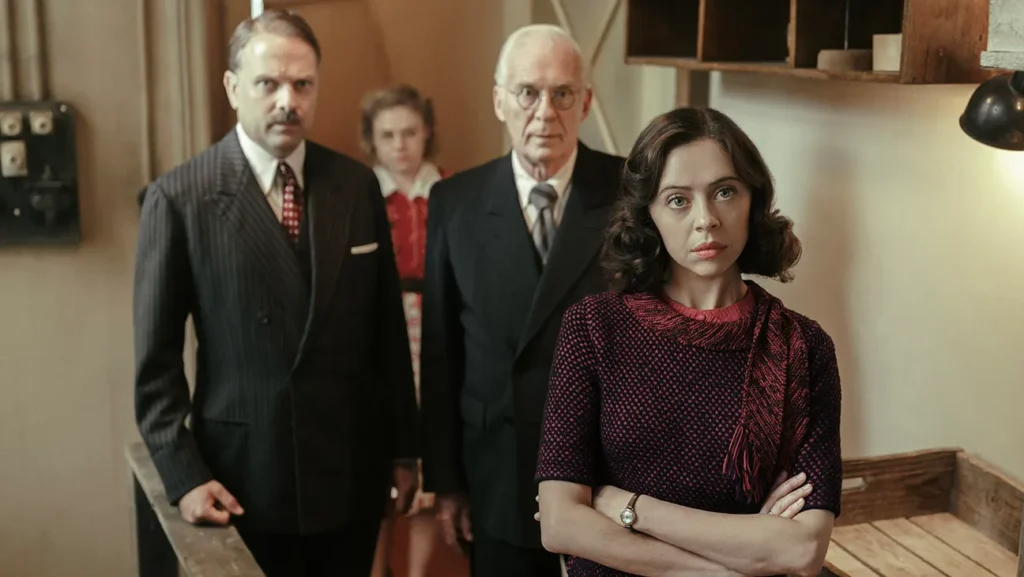
Where Jonathan Glazer’s The Zone of Interest hones in on the horrible silence of Nazis in the face of tragedy, Joan Rater and Tony Phelan’s A Small Light is a study in heroism amid those same atrocities. It’s the story of Anne Frank, told not through the resilience of that young girl but of Miep Gies (A radiant, wily Bel Powley), Otto Frank’s secretary who helped hide Anne and the Franks in the famous Secret Annex during World War II. Hiding from the Nazis is bravery enough; hiding others from the Nazis, while also secreting supplies to them and doing whatever you can to resist in the lion’s den, is something approaching sainthood. Powley is a phenomenal, clever, heartbreaking lead, as is Joe Cole as Miep’s husband who finds himself taking more direct routes of resistance. But the true highlight is Liev Schreiber as Otto Frank, whose stoic silences hint at volumes of pain. [Clint Worthington, editor-in-chief]
Barry (HBO)
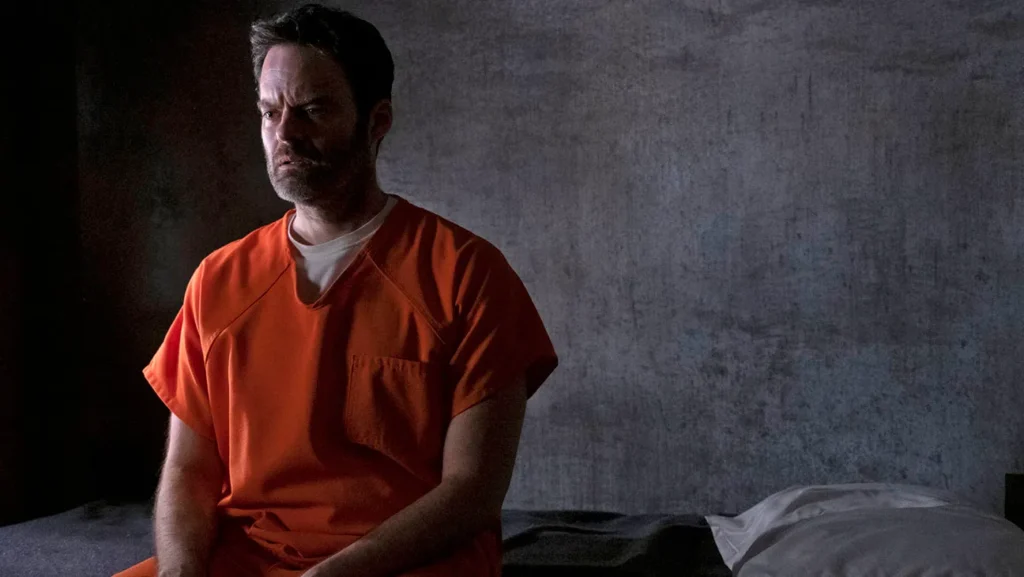
When HBO’s Barry started, it was a droll showbiz comedy with snippets of grim hitman action; in its fourth season, it completely swapped tones, turning into a grand character study of a broken man (Bill Hader, as grizzled and fanatical as ever) scrambling to redeem himself from the irredeemable path he’s taken. But in its final stretch, it became something more existential, as its cast of doomed characters tried, and failed, to mine purpose out of their respective failings. For Barry or Anthony Carrigan’s NoHo Hank, that’s a failed bid at domestic bliss; for Sarah Goldberg’s Sally or Henry Winkler’s Gene Cousineau, it’s the chance to turn their pain into Hollywood success. Right up to its harrowing final moments, Barry proves an incredible proof of concept for Hader as a star and filmmaker — and a searing critique of the many ways we destroy each other, with bullets or Broadway lights. [CW]
The Bear (FX)
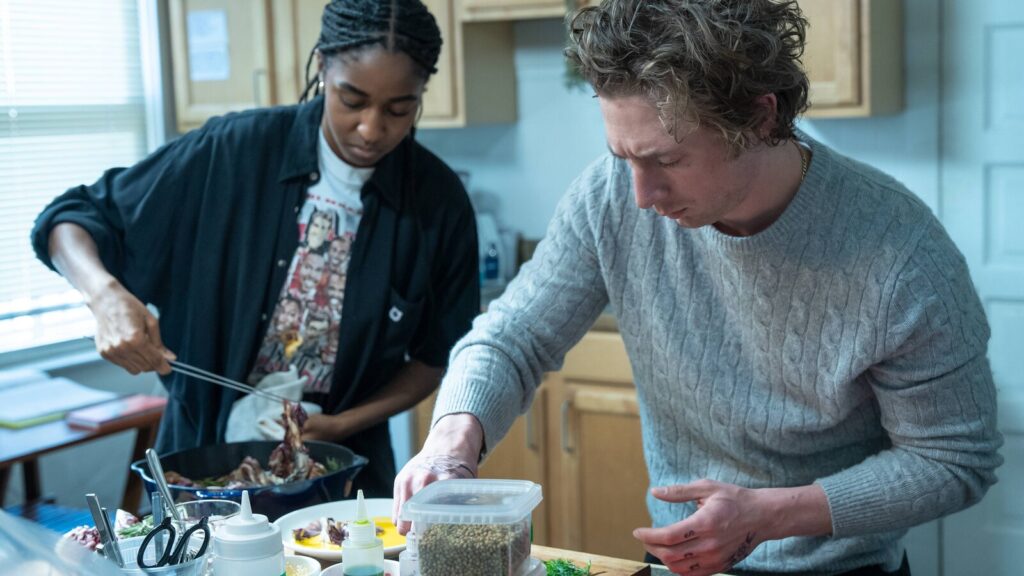
Given how much critical ink The Bear‘s harrowing Christmas episode “Fishes” earned, one would be forgiven to think the show is more than just a stress delivery system. Certainly, it does induce the kind of teeth-grinding tension that typically only one’s dysfunctional family gathering might conjure. Still, compare it to, for instance, the season’s fourth episode, “Honeydew.” An ode to dessert and collaboration, it is as sweet, quiet, and tender as the Christmas episode is bruising. There are certainly better episodes in the season than “Honeydew.” Still, it demonstrates how remarkable and wide-ranging a palette The Bear can call upon, reframing its moments of intensity as all the more impressive. Pair that with the year’s most interesting and well-calibrated soundtrack, which draws on artists from R.E.M. to Freddie Fender to Taylor Swift, and viewers get quite the dramatic feast. [TS]
Beef (Netflix)
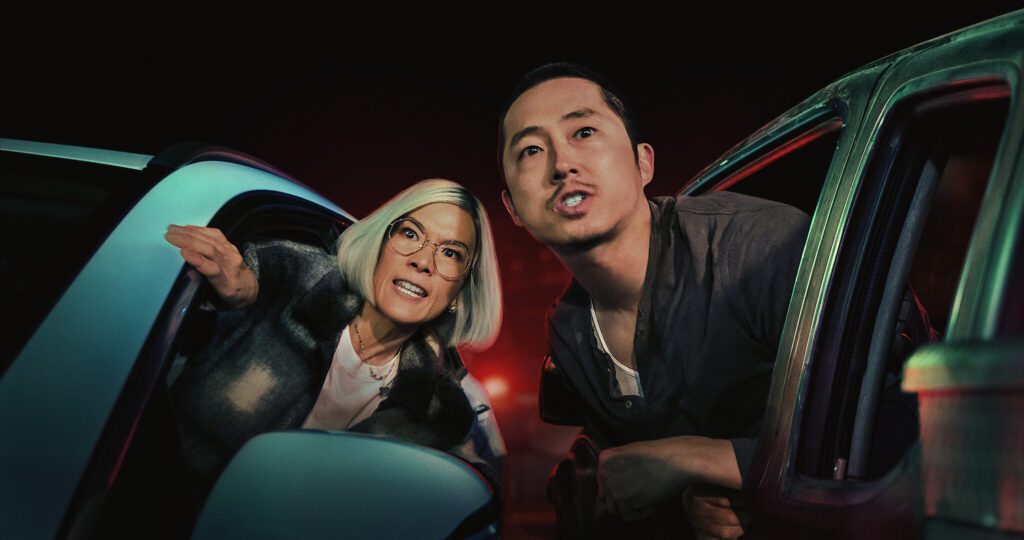
Throughout Beef’s ten episodes, Danny (Steven Yeun) and Amy (Ali Wong) set fire to their lives and the lives of those around them. They’re raging against each other because you can’t land a punch on the concept of a life less satisfying. When released in April, it felt incredibly of the moment, plugged directly into the infuriated moment. In the months since, it has grown to feel prophetic, a small-scale reflection of a world full of ills perpetrated by people too angry to do the right thing. Despite its posture as a coiled snake of rage, Beef still dodges cynicism to affirm humanity’s essential goodness. Despite letting its character indulge in every ugly impulse, it refuses to succumb to the temptations of doomerism. To paraphrase Seven, the series reminds us this is a hard, sometimes terrible, world worth fighting for. [TS]
Cunk on Earth (Netflix)

There’s so much hilarious about Charlie Booker-created, Diane Morgan-starring mockumentary, that it feels reductive to focus on one joke. Nonetheless, it feels wrong not to acknowledge that for five episodes, the series builds and builds on a perfectly executed joke centered on the improbable early 90s C+C Music Factory dance hit, “Gonna Make You Sweat (Everybody Dance Now).” It alone would likely earn a place on this list. Still, the show has far more to offer than just that which is “dope enough, indeed.” For example, watch when Philomena Cunk (Morgan) learns Britain still possesses active nuclear weapons. As an academic disabuses Cunk of the notion that Britain’s missiles are “blanks,” Morgan perfectly captures the host’s mounting existential terror. Then, a beat later, she rescues herself and the moment from the serious by moving the professor on to a discussion of ABBA. High humor, low humor, and a reminder that the horror of nuclear war still very much exists, all in a side-splitting two-minute span. [TS]
Escaping Twin Flames (Netflix)
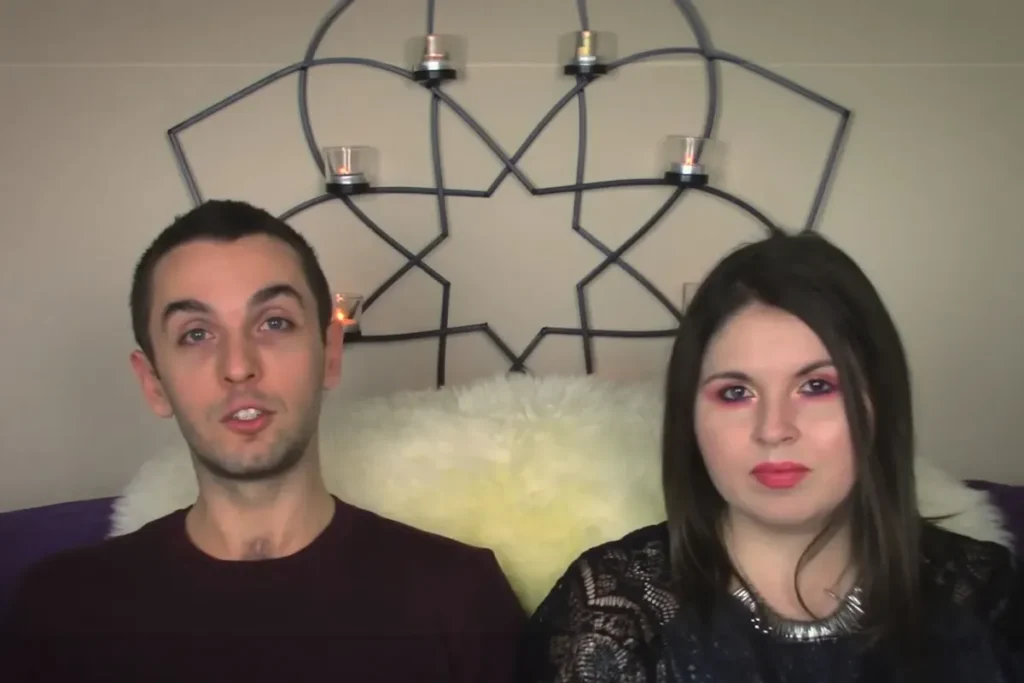
The concept of having a “soulmate” will never be the same after watching Netflix’s Escaping Twin Flames, a documentary about yet another self-improvement program that eventually devolved into a cult. It seems impossible to believe that an organization originally focused on finding one’s perfect romantic match could turn into something where the leader demands that the participants call him “God,” and yet, that’s just the route that the Twin Flames Universe took. Its members surrendered themselves fully to the dubious authority of leader Jeff Divine (perhaps an even bigger dork than NXIVM’s Keith Raniere), who forced them to stay in unhappy, abusive relationships and even deny their sexuality or gender identity, mostly just for the hell of it. Your jaw will hang open in disbelief for much of the three episodes of Escaping Twin Flames, but never so much as the reveal at the end that it’s still operating with a robust membership. [Gena Radcliffe]
Fall of the House of Usher (Netflix)
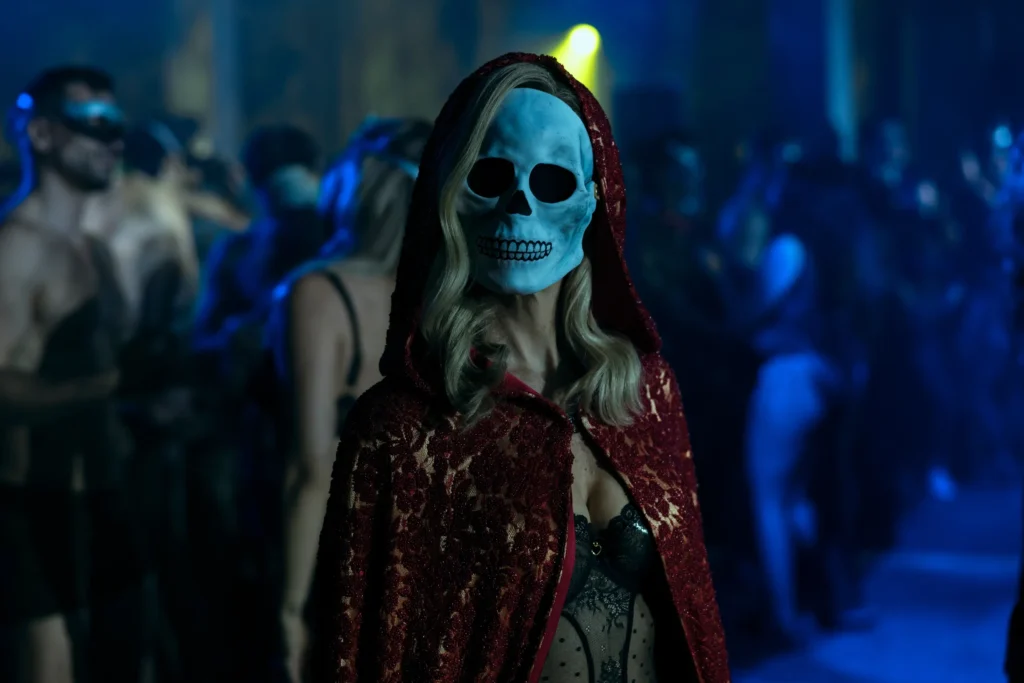
It says a lot that the worst you can say about Mike Flanagan’s weakest work, last year’s The Midnight Club, was merely “okay.” His remarkable run continued with his final collaboration with Netflix, the deliciously gruesome Fall of the House of Usher, which used the works of Edgar Allan Poe to exact supernatural justice on a fictitious version of the Sackler Family. While not a tearjerker on the same level as Midnight Mass, it was still one of the most satisfying watches of the year, featuring Bruce Greenwood and Mary McDonnell as a pair of bigger-than-life villains who finally face the one thing that no amount of money can ever get you out of. [GR]
Fargo (FX)
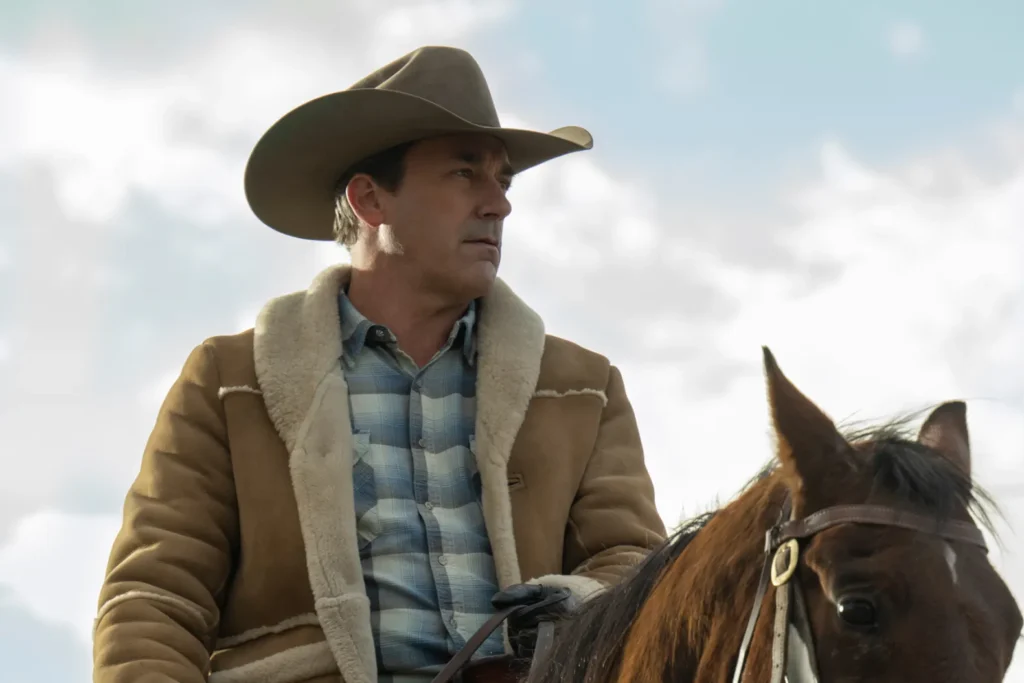
Fargo Season 5 drops the audience into a United States very much gearing up for January 6, even if it doesn’t know it yet. When a meeting in an average-sized Minnesota town devolves into an outright riot, Dot Lyon (Juno Temple) overreacts in protecting herself. Despite nothing coming of the incident, it sets off a series of events that pull Roy Tillman (Jon Hamm) into her life. A sheriff/king of all he surveys, Tillman has some very definitive ideas about what justice looks like and is prone to mangling scripture to justify that point of view. Their conflict, him an immovable object, her an unstoppable force, grows to include Dot’s in-law’s debt-collecting empire, struggling banks, cops ranging from utterly corrupt to near saintly, and an otherworldly criminal Ole Munch (Sam Spruell). Like many of the best shows on this list, it is a cracked glass reflection of the precipice we’re all teetering on. With Hamm sporting a nice set of nipple rings for good measure. [TS]
For All Mankind (Apple TV+)

In some ways, the newest season of For All Mankind is the first where the series stops reaching for the stars. After years of alternate events altering the world of the show in comparison to the history we knew, the 2003 of Season 4 feels not unlike the 90s of our world. There’s a sense of comfort, of basking in achievement, of a lot of people who’ve been working hard for years feeling like they’ve arrived. And much like we were about the 90s, the characters in For All Mankind are very wrong. Class division, international rivalries too quickly written off as resolved, and interpersonal strife has always been part of the formula that made the series work. This time out, however, they foreground those elements; the class conflict, in particular. Even in this alternate world of incredible achievement, the minor flaws handwaved at repeatedly become the cracks that threaten everything. The result remains recognizably Mankind even as it applies a new frame. [TS]
I Think You Should Leave with Tim Robinson (Netflix)

“I see the world wildly, and in wild ways.” More than one of the many off-kilter, childlike line deliveries in the latest season of Netflix’s singular sketch show, it feels like a mission statement for Tim Robinson’s wild worldview. Every sketch in I Think You Should Leave is a masterclass in social discomfort, pressing on the limits of our relationships with our fellow man in gut-busting ways, and the latest season is no exception. VR game shows that make you forget how to breathe, pigs in masks making you believe there are monsters on this world, the freedom of letting go of society’s rules at the behest of your “shirt brother” — each hilarious sketch contributes to the broader gag Robinson’s going for. The social contract is just a set of rules, man. Tim wants you to promise never to do a rule again. [CW]
I’m a Virgo (Prime Video)
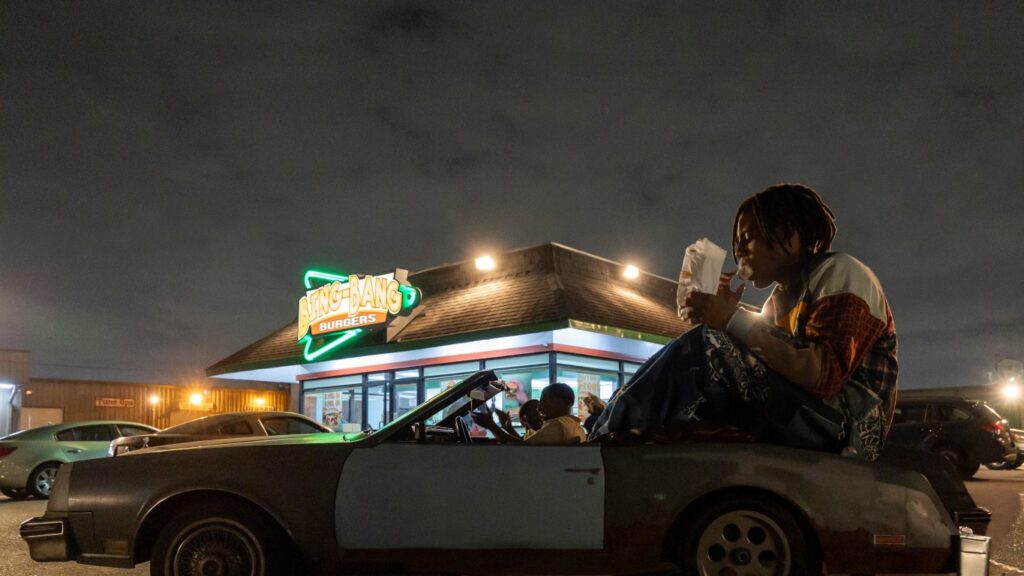
After smashing onto movie screens with his bold, uncompromising Sorry to Bother You, The Coup’s Boots Riley follows up with this (literally) tall tale of a young Black man (Jharrel Jerome) who grows up to be 13 feet tall and escapes his sheltered upbringing to find himself on the mean streets of Oakland. Loaded with heaps of imagination and the bold-faced social satire Riley’s known for — Jerome’s Cootie learns the literal and metaphorical ways his Blackness makes him a villain in the eyes of society — I’m a Virgo is an offbeat delight, and further proof of Riley’s boundless ambition. [CW]
Jury Duty (Freevee)

The logline of Jury Duty is a bit queasy, suggesting a cruel practical joke. In practice, however, it was perhaps the kindest and most delightful show on TV in 2023. The series hit gold with Ronald Gladden, the only member of the cast unaware of the gag. Affable and charming, he reacts to each new situation honestly and with kindness for everyone around him. Surrounding him with a cavalcade of talented actors, including James Marsden as a petty, egotistical version of himself, doesn’t hurt. Their ability to commit without blinking is impressive, and their instincts for comedy under those circumstances even more so. The final episode, which takes Ronald and the audience behind the scenes, feels like a magician teaching people how a trick works because that’s more or less what the show’s been—an eight-episode magic trick performed flawlessly for the world’s most admirable mark. [TS]
The Last of Us (HBO)
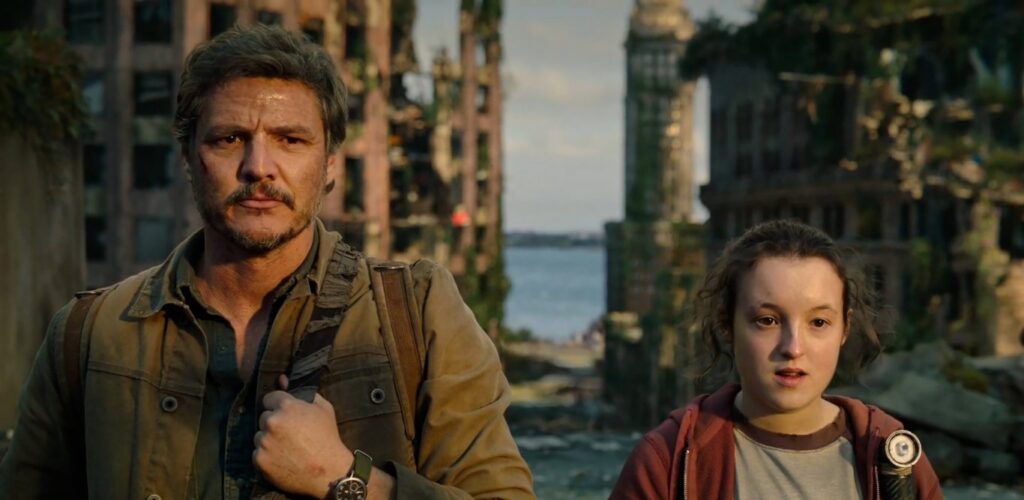
Full disclosure: I have never played a single minute of The Last of Us. I didn’t know anything about it, except that it involved zombies. One of the best things about The Last of Us as a television series is that you don’t have to. It stands alone as a gripping, engrossing story, without newcomers needing a primer or a spreadsheet to keep up with what’s happening, at least in its initial season. While leads Pedro Pascal and Bella Ramsey make for engaging, prickly heroes, the standout third episode centered mostly upon The White Lotus’ Murray Bartlett and Nick Offerman as an aging couple trying desperately to maintain some sense of peace and normalcy amid chaos and death. It’s an extraordinary episode that made it impossible to ever hear Linda Ronstadt’s “Long Long Time” again without bursting into tears. [GR]
Minx (Starz)
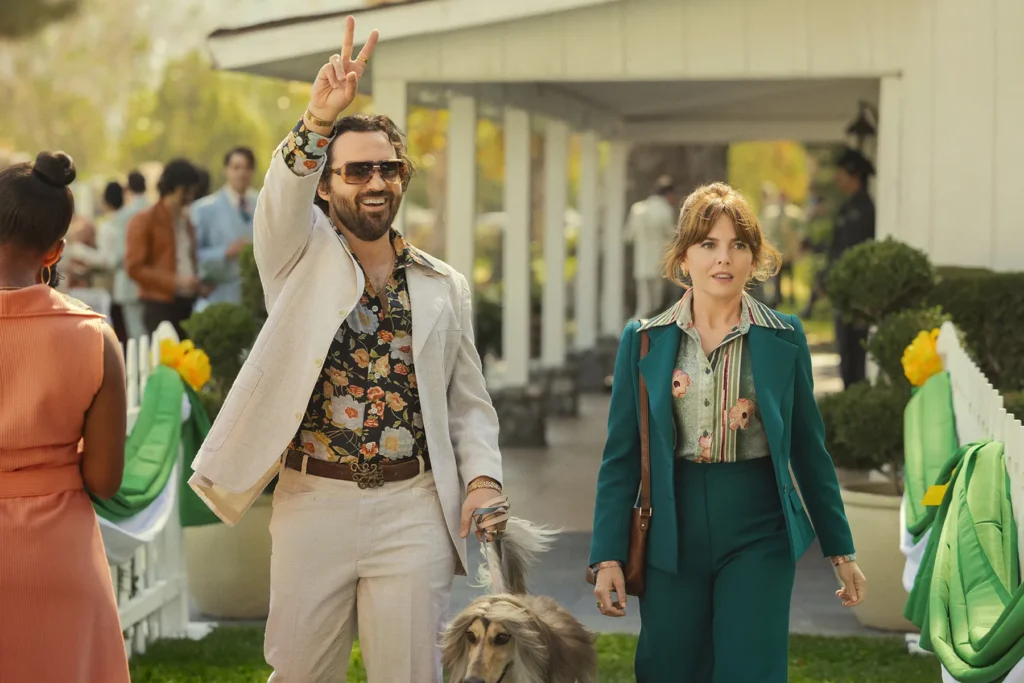
Despite Minx‘s rocky path to season 2—a renewal, a cancellation mid-filming, a change in networks—the show betrays none of that in execution. Instead, it starts moving right out of the gate and doesn’t break stride until it reaches the series finale. More consistent in tone and pacing than season 1, Minx remains every bit as fun and energetic. Some twists, like Shelley’s (Lennon Parham) evolving sexuality, effectively create tension without turning characters into villains for the sake of drama. Others, such as Doug’s (Jake Johnson) struggles, remind viewers that just because a character is likable doesn’t mean they’re not capable of bad things. And, like its initial effort, it does well being a modern-day metaphor (see: the current state of Sports Illustrated, the world of periodical publishing in general) without fracturing the reality of its period setting. [TS]
The Other Two (Max)
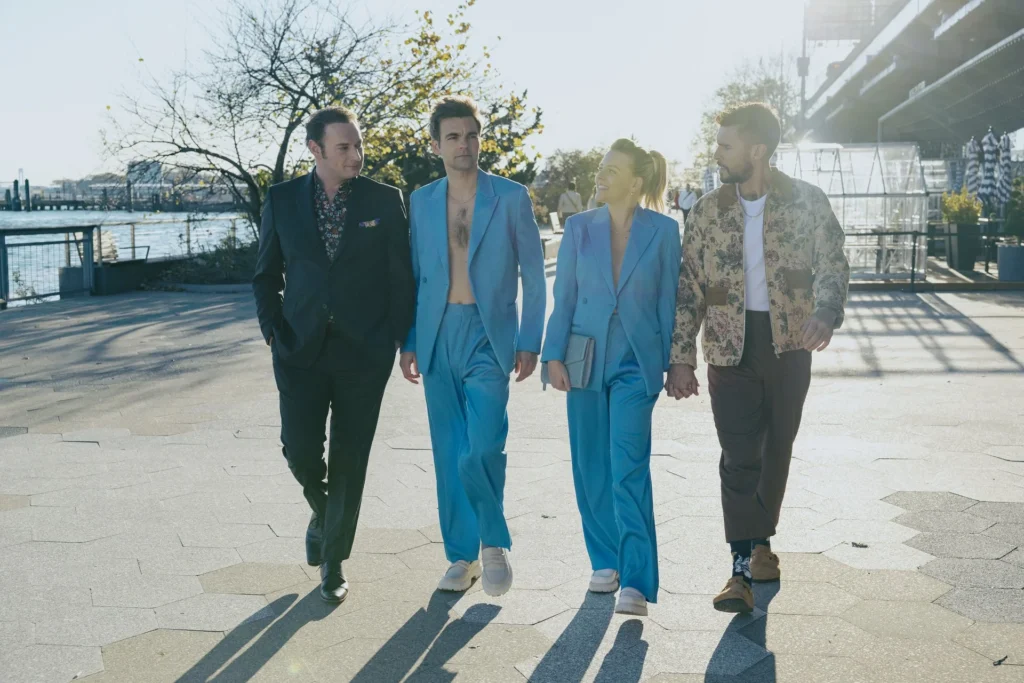
Max’s cult hit comedy series truly hit its stride in its third season, which made its most hilarious, salient points about the hollowness of show business just as the vagaries of “the industry” (and some allegedly bad behavior from its showrunners) sent it to an untimely death. But Chris Kelly and Sarah Schneider get a few good licks in on their way out, from the vapidity of network procedurals (a Pleasantville-inspired lark in which Cary Dubek tries to free his castmates from their formulaic prisons) to box-checking queer characters in big studio films (Cary becoming a “gay icon” by voicing a gay glob in a Disney movie). Much as its finale may have fumbled the ball — letting the industry off the hook after three seasons of pitch-perfect skewering — we’ll always have Globby. [CW]
Our Flag Means Death (Max)
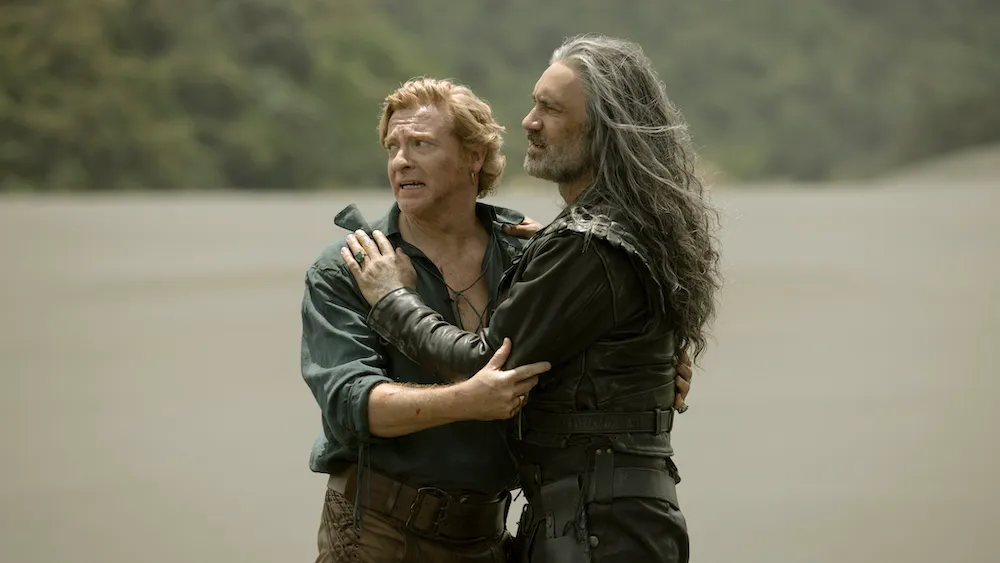
Whoever thought that, when they started Our Flag Means Death they would end up Invested in a fictitious romance between real-life pirates Edward “Blackbeard” Teach, and Stede Bonnet? TV’s most unabashedly queer comedy only got better in its second season, as alliances formed against new threats, Bonnet’s newly reformed crew found their sea legs, and Ed and Stede can openly declare their love for each other. Though stars Rhys Darby and Taika Waititi remained as lovable as ever, an unexpected fan favorite this season was Con O’Neil as Izzy Hands, Ed’s perpetually aggrieved and put-upon right-hand man, who revealed his soft, nougaty center with a heart-rending talent show performance of “La Vie en Rose” in episode 6. [GR]
Paul T. Goldman (Peacock)

One of the strangest, most slept-on shows of the year, Paul T. Goldman offers metatextual farce by way of, however you slice it, the most deluded man on the planet. Kicking off from an email Borat 2 director Jason Woliner receives from self-published author Paul T. Goldman — a nebbishy, middle-aged divorcee with delusions of grandeur — Woliner engages in the biggest called bluff in TV history, as he decides to film the man’s self-written screenplay based on a fanciful version of his “life story.” What’s more, Goldman plays himself in scenes meant to mimic his supposed adventures tracking down his ex-wife’s sex trafficking ring, gut-busting in the moment and ultimately revealing in aggregate. It’s a hilarious testament to man’s knack for self-mythologizing, with TV’s most mercurial test subject at its center. [CW]
Poker Face (Peacock)
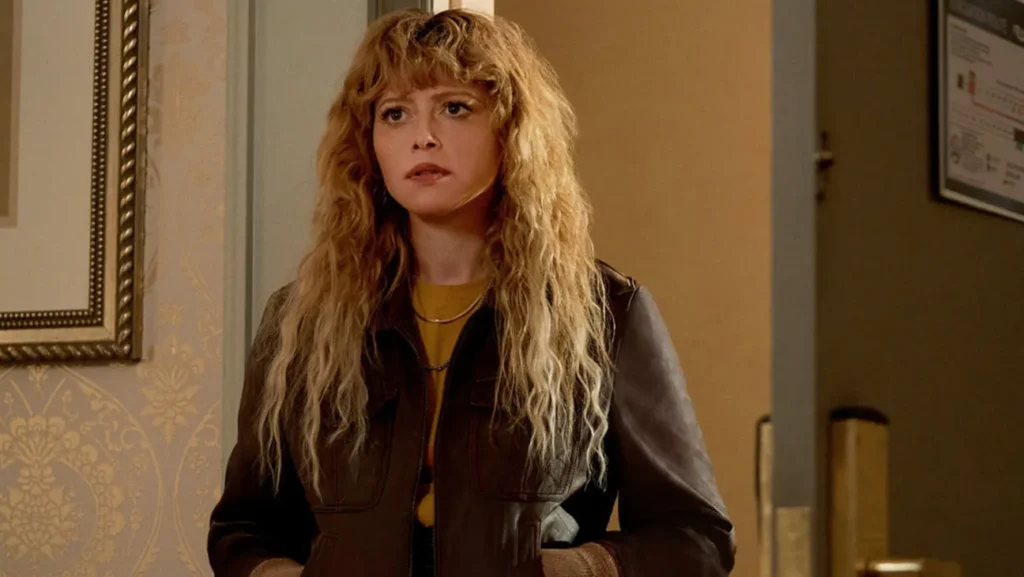
From the very first episode of Russian Doll, it was clear that Natasha Lyonne was not your ordinary TV heroine. Wry, prickly, and unconcerned with being perceived as “likable,” it instead has the opposite effect: she’s very likable, in an enviably effortless way. Her second series, Peacock’s Poker Face, puts her natural charm into even better use, playing a fuck-up turned amateur detective who uses a talent for spotting liars to effective results. Going toe to toe with such guest stars as Ron Perlman, Ellen Barkin, and Nick Nolte, Lyonne revealed herself to be one of TV’s most engaging and witty comic actors, and Poker Face itself as smart, breezy entertainment, a standout in a sea of endless #content. [GR]
Reservation Dogs (FX/Hulu)
FX’s three-season wonder, gone far too soon, nonetheless ends on a note of transition for its cast of young Indigenous Americans. But before it gets there, it must take them on a journey — not just the titular shitasses, but the whole cast of Native actors, all of them as funny and heartfelt as the next. Its first half is a quest to return from California, where the Rez Dogs trekked last season to say goodbye to their dear, departed friend; the second half meanders with purpose, checking in on each of its supporting cast as they look to the mistakes of the past and the possibilities of the future. It’s a moment of maturation for its young cast, and of the kinds of Native-led stories that can command an audience in today’s TV landscape. One hopes this paves the way for more stories in that vein, charting the specificity of the Native experience with humor and beauty. [CW]
The Righteous Gemstones (Max)
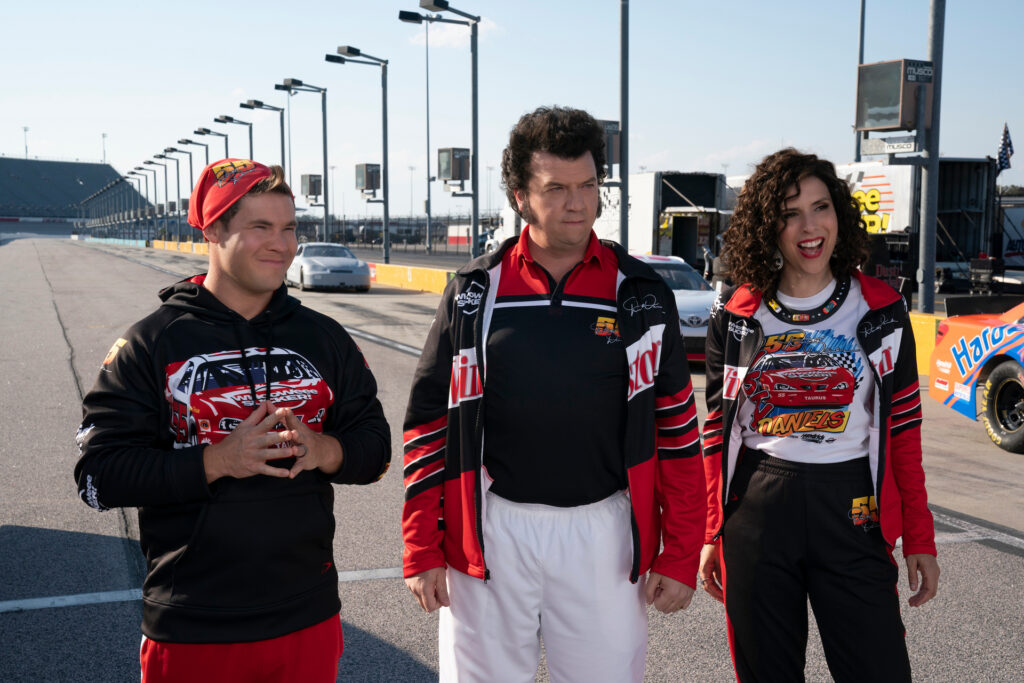
Some have commented that Succession and The Righteous Gemstones are two sides of the same coin. One is a drama that delivers laughs, the other a comedy that nails every dramatic beat it tries, both about how patriarch who refuses to let go can psychologically and emotionally cripple their families in the name of protecting the brand. It’s not a take without merit, but it underestimates how compelling and unique Gemstones tells its story. Season 3 takes the show as dark and funny as ever. It’s impossible to imagine another series making burgeoning same-sex romance, a campaign against porn that involves buying all up, a furniture-crushing machine, countless explosions, and a religious-themed Family Feud game show fit together and be riotously funny at the same time. And yet, The Righteous Gemstones makes it look easy. It’s enough to give anyone, regardless of what they know about charismatic Evangelicalism, the giggles and the heebie-jeebies at the same time. [TS]
Scavengers Reign (Max)
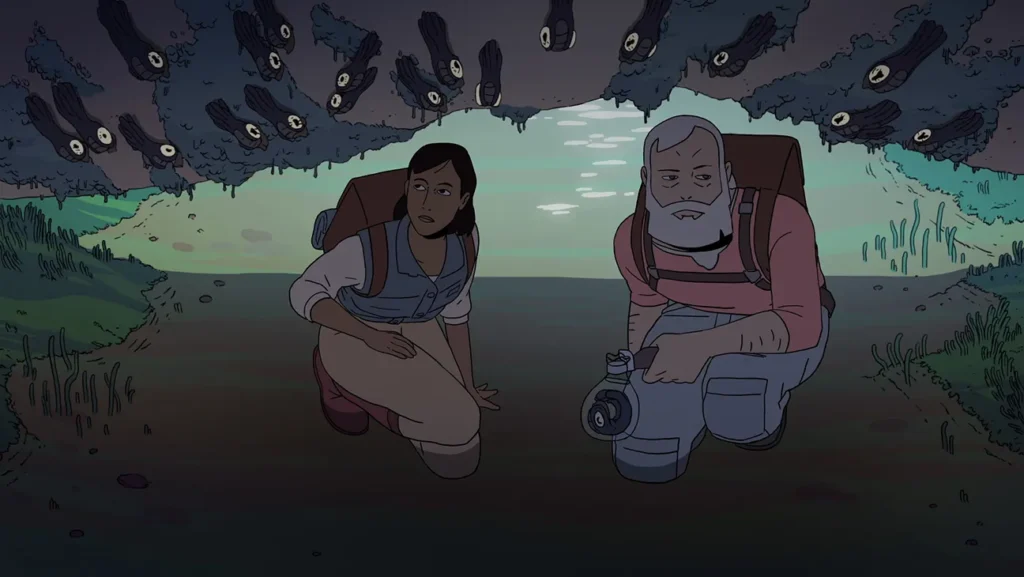
Extrapolated from an Adult Swim short, Max’s biggest surprise is also one of science fiction’s greatest TV triumphs. Told through sparse, brutal animation and minimalist dialogue for much of its runtime, Scavengers Reign strands less than half a dozen survivors of an imperiled transport ship on an alien planet and watches them try to conquer, or at least survive, the harsh environs they encounter. And this planet is truly alien, filled with imaginative creatures the likes of which we’ve never seen before — some helpful, some hostile, all of them reflecting the vagaries of the humans that interact with them. It’s the ideal setting for the kind of morality plays the genre excels in telling. [CW]
Silo (Apple TV+)
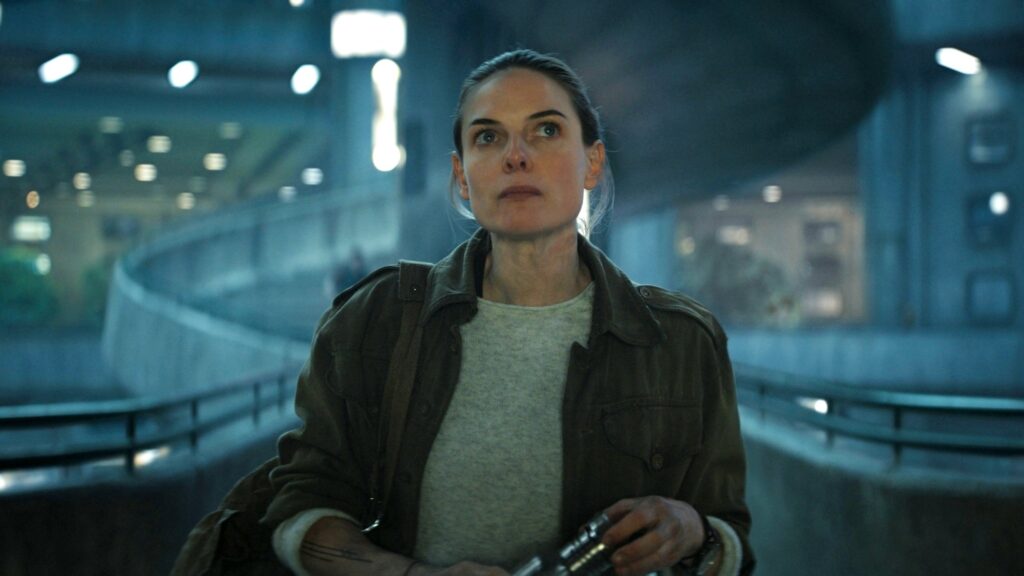
Like any genre, science fiction has its tropes. Done well, those tropes can be enjoyable no matter how often they pop up. Still, when a series zigs while others zags and nails the dismount, it makes for an incredibly satisfying watching experience. For Silo, that moment arrives in the first two episodes. It’s such a simple upending of expectations, and that’s why it makes such an impression. Of course, this twist would mean nothing without a strong cast. Good thing, then, that Silo has one of the most stacked casts on streaming. At the center stands Rebecca Ferguson. Bristling with indignation at nearly every interpersonal reaction, Ferguson still delivers a magnetic on-screen performance. She’s not pleasant, certainly, but she’s great to watch. Her supporting cast, including David Oyelowo, Rashida Jones, (a finally well-cast) Common, Will Patton, and MVP Tim Robbins, is excellent wall-to-wall. [TS]
Slip (Roku)
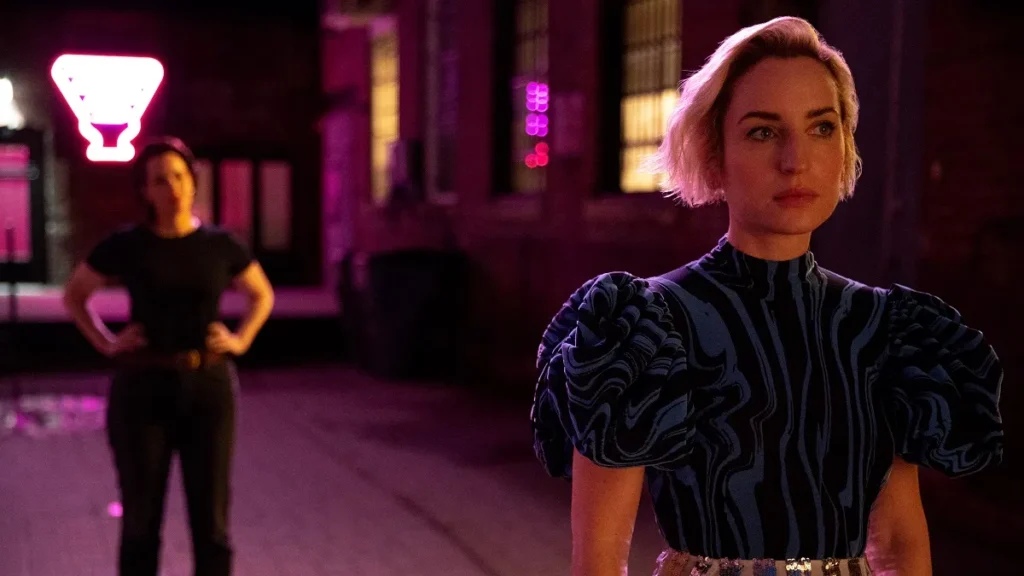
While many’s patience for multiverse stories has grown thin, to lump Slip into that pile of “too much multiverse” would be a tremendous mistake. Mae (show creator Zoe Lister-Jones) travels to alternate timelines every time she orgasms. With each sexual encounter, she wakes up in a new bed in a new house with a new long-term relationship. The only constants are her shoes and her best friend, Gina (Tymika Tafari). What seems like the setup for a sex farce, however, quickly reveals itself as pricklier and more intriguing. Mae and Gina are grown-up products of the foster system, another world where a best friend and a pair of shoes are often all you can count on. Mae’s disillusionment with and subsequent estrangement from her “real life” via alternate worlds takes her lifelong ambivalence and blows it up to cosmic proportions. As a result, the hilarious series is laced with a melancholic sense of unfulfillment, one the Lister-Jones can often push to the foreground or background with subtle shifts in her face and body language. [TS]
Succession (HBO)

“You are not serious people.” These are some of Logan Roy’s last words to his ambitious clan of spawn, and maybe Jesse Armstrong’s greatest rebuke to his cast of self-motivated climbers. HBO’s smash-hit dramedy carried its acid wit and uncompromising satire into its thrilling final season, opening with the surprise death of the Roy family patriarch and exploring the fallout of a clan who always hoped for the old man to croak, but also don’t know how to navigate the ruthless paths that lie next for them. And even among these ruthless kids’ machinations and weaponized manipulations, there’s a deep well of sadness at their core that lends Succession just the slightest hint of pathos. That Armstrong can make you sneer and sob at the same character within moments of each other is a testament to the show’s brilliance, as well as its gut-punch ending where nobody wins, except capitalism. [CW]
What We Do in the Shadows (FX)
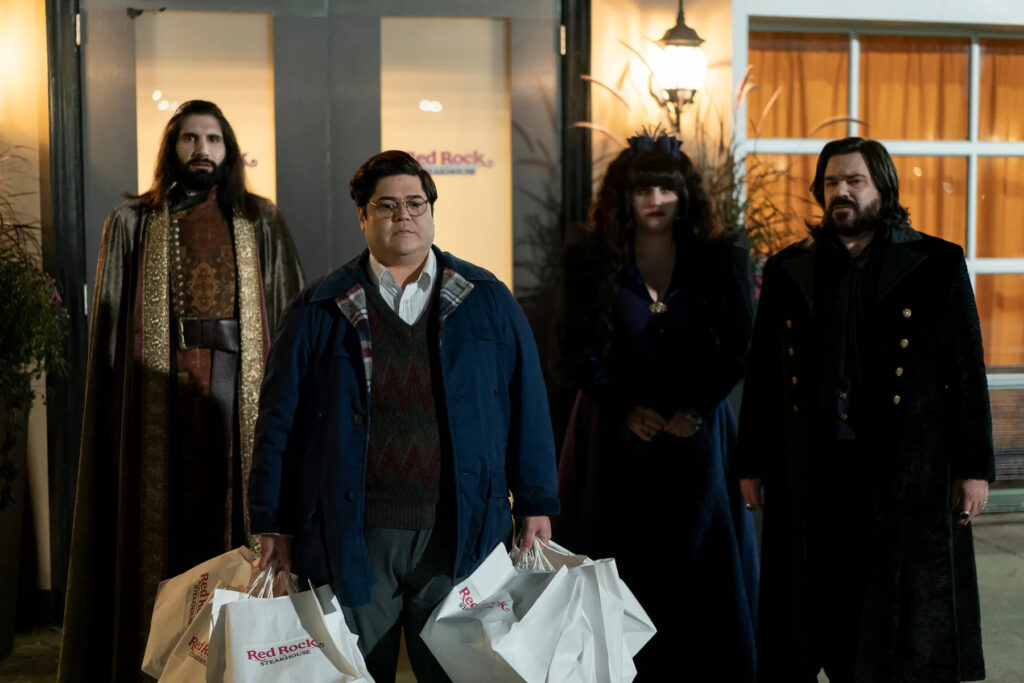
With every new season of What We Do in the Shadows comes the smug assurance (for me, at least) that this will be the season when they start slipping, when the jokes land less and everything starts to feel a little tired. Yet, the fifth season felt as fresh as the first, still perfectly balancing genuine warmth with cheeky (and occasionally grotesque) humor. While standout episodes include neighbor Sean’s disastrous attempt to throw a pride parade as part of a political campaign, and vampire-in-progress Guillermo’s trip to an underground urgent care clinic, the show overall remains the most consistently and outrageously funny show on television, and it doesn’t even seem like they’re trying that hard. We’ll even forgive them for letting another season end without Guillermo and Nandor admitting that they’re madly in love. [GR]